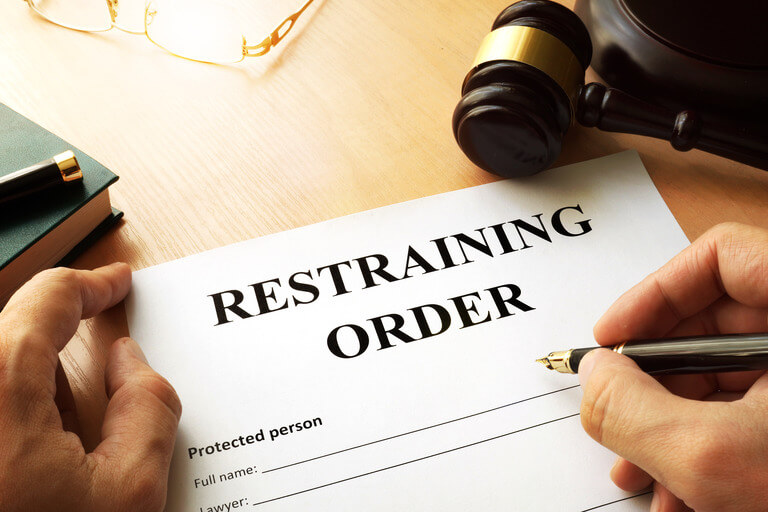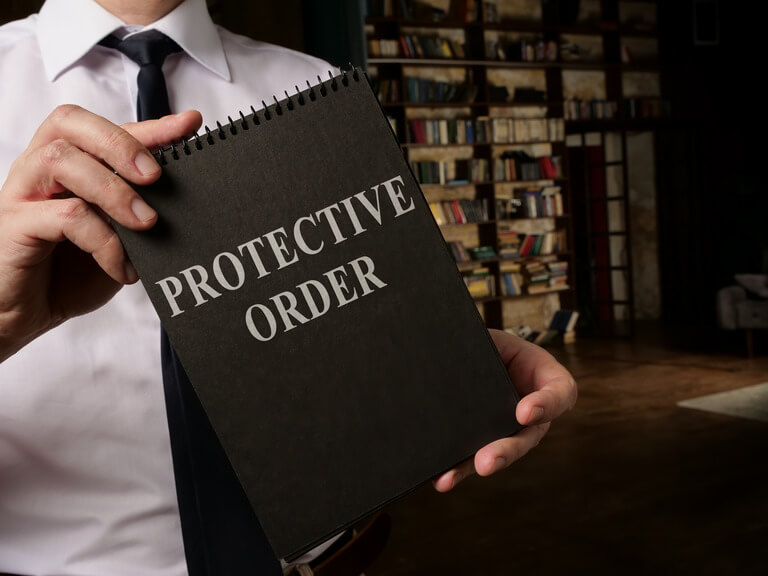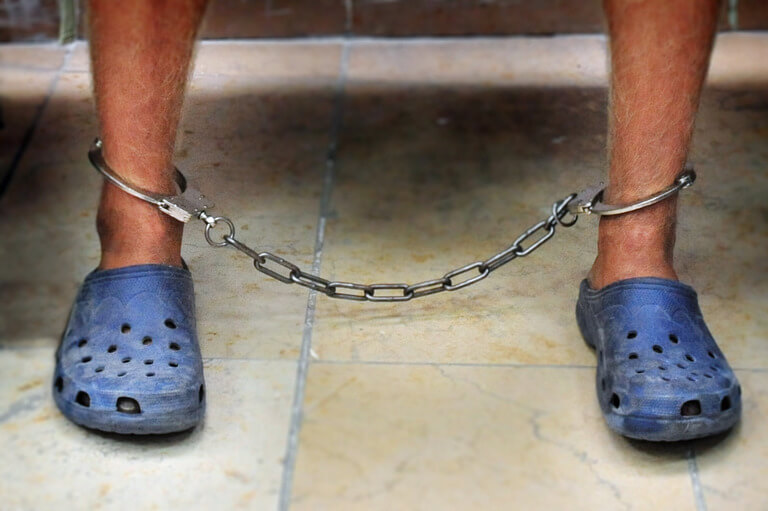In Nevada, a restraining order can protect a victim of domestic violence. It stops the abuser from contacting or coming near the victim or their family members and is issued by a court. This document ensures that the victim is safe from any further harm.

What You Need to Know
To be granted a restraining order in Nevada, someone must go to court and show why they need protection. If the judge sees that the victim is in real danger, they can provide a temporary restraining order while they wait for a hearing.
During the hearing, the court will review the facts from both sides before making a decision. A permanent restraining order can last for one year but may be renewed if the victim is still in danger.
Breaking a restraining order is a crime that may be met with serious penalties, such as fines or jail time. It’s important to remember that this offense could be reported to the police right away.
Breaking a restraining order can have serious legal consequences. It can impact child custody decisions or be used as a factor in other court cases. It’s important to take these orders seriously and obey them.
Fighting a Restraining Order
If you or someone you know is facing a restraining order in Nevada, there are a few things you can do to fight it.
First, it’s important to question the evidence provided by the accuser. To do this, review the petition and note any issues you disagree with.
Next, gather evidence that proves your innocence. Gathering evidence like emails, texts, or what others saw can help build a strong defense of your case. When you present this information, the judge may decide that a restraining order is not needed.
Cross examine your accusser and challenge their credibility if necessary.
Additionally, call expert witnesses for further assistance if needed.
Lastly, stay professional throughout the hearing. Remember, that the judge will assess all evidence presented.

Assessing and Challenging the Evidence Presented by the Accuser
Assessing and challenging the evidence presented by the accuser in a restraining order hearing is an essential part of defending against the order.
Identifying Potential Weaknesses in the Accuser's Case
Identifying potential weaknesses in the accuser’s case can help you prepare a strong defense against a restraining order. Here are some potential weaknesses that you may want to look for:
- Lack of Evidence: If the accuser cannot provide any concrete evidence to support their allegations, it may be difficult for them to prove their case. Look for inconsistencies or gaps in their testimony or evidence, and use them to challenge their claims.
- Credibility Issues: If the accuser has a history of making false accusations or has been caught lying in the past, it may undermine their credibility. Look for evidence or witnesses that can testify to their character, and use it to challenge their claims.
- Motive: Consider whether the accuser has a motive for making false accusations. For example, they may be seeking revenge or trying to gain an advantage in a child custody dispute. Look for evidence or witnesses that can support this theory, and use it to challenge their claims.
- Bias: Consider whether the accuser has any biases that may affect their testimony. For example, they may have a history of bias against men or against a particular ethnicity or religion. Look for evidence or witnesses that can support this theory, and use it to challenge their claims.
- Self-Defense: If you are accused of domestic violence, consider whether your actions were in self-defense. Look for evidence or witnesses that can support this theory, and use it to challenge the accuser’s claims.
It is important to note that these weaknesses are only potential factors to consider and that each case is unique. It is crucial to consult with an experienced attorney who can help you identify weaknesses in the accuser’s case and develop a strong defense strategy.

Supporting Your Case
Gathering evidence to support your own case is crucial when defending against a restraining order in Nevada. Evidence can help you challenge the allegations made by the accuser and prove that the restraining order is unnecessary or unwarranted. Here are some reasons why gathering evidence is important:
- Evidence Supports Your Defense: Evidence such as emails, text messages, or witness statements can help support your defense and provide a counter-narrative to the accuser’s claims. By presenting compelling evidence, you may be able to convince the judge that the restraining order is unnecessary.
- Evidence Can Disprove the Accuser’s Claims: Evidence can also be used to challenge the accuser’s claims and prove that their allegations are false or exaggerated. For example, you may be able to show that the accuser’s version of events is inconsistent with the facts, or that they have a history of making false accusations.
- Evidence Can Mitigate the Severity of the Restraining Order: Even if you are unable to completely defend against the restraining order, evidence can help to mitigate its severity. For example, you may be able to show that the accuser’s claims are only partially true, or that the restraining order is overly restrictive.
- Evidence Can Be Used in Future Legal Proceedings: If the restraining order is granted, evidence can be used in future legal proceedings, such as a child custody case or a criminal trial. By gathering evidence and presenting a strong defense, you can help protect your rights and interests in future legal proceedings.
In summary, gathering evidence is crucial when defending against a restraining order in Nevada. It can help support your defense, challenge the accuser’s claims, and protect your rights and interests in future legal proceedings.

Demonstrating that Allegations Are Untrue or Exaggerated
Rebutting false accusations is a crucial step in defending against a restraining order in Nevada. Here are some steps you can take to rebut false accusations:
- Remain Calm and Respectful: It is important to remain calm and respectful during the hearing, even if you disagree with the accuser’s claims. Being defensive or argumentative can harm your case.
- Identify the False Accusations: Identify the specific false accusations made by the accuser. Take notes and gather evidence that can refute each of these accusations.
- Present Evidence: Present evidence, such as emails, text messages, or witnesses, that can refute the false accusations. For example, if the accuser accuses you of physical abuse, present evidence that shows you were not physically present at the time of the alleged incident.
- Cross-Examine the Accuser: Use cross-examination to challenge the accuser’s testimony and highlight any inconsistencies or contradictions in their story. This can help to weaken their credibility and make it more difficult for them to prove their case.
- Call Witnesses: Call witnesses who can testify on your behalf and refute the false accusations. For example, if the accuser accuses you of being violent, call witnesses who have seen you act peacefully or have never seen any signs of violence from you.
- Provide an Explanation: Provide an explanation for any behavior that the accuser has interpreted as threatening or abusive. This can help to show that your behavior was misunderstood or taken out of context.
- Argue for the Lack of Evidence: If the accuser cannot provide any concrete evidence to support their allegations, argue that the restraining order is unnecessary. You may also argue that the evidence presented is not sufficient to warrant a restraining order.
Rebutting false accusations is essential in defending against a restraining order in Nevada. By remaining calm and respectful, identifying false accusations, presenting evidence, cross-examining the accuser, calling witnesses, providing an explanation, and arguing for the lack of evidence, you can build a strong defense against a restraining order.

How to Present Witnesses
Presenting witnesses and other forms of corroboration can be critical in proving one’s innocence in a restraining order hearing in Nevada.
Here are some steps to present witnesses and other forms of corroboration:
- Identify Witnesses: Identify witnesses who can provide testimony that supports your case. These can be individuals who have observed the behavior in question or have information that can be used to disprove the accuser’s allegations.
- Subpoena Witnesses: If necessary, subpoena the witnesses to ensure that they appear in court. This may involve providing the court with the names and contact information of the witnesses in advance.
- Prepare Your Witnesses: Prepare your witnesses in advance by discussing what they will be testifying to, what questions they can expect to be asked, and what they should expect from the hearing.
- Introduce Witnesses: Introduce your witnesses during the hearing and provide their name, relationship to you, and a brief description of what they will be testifying to.
- Ask Questions: Ask your witnesses questions that will help to establish your innocence and undermine the accuser’s case. For example, if the accuser has accused you of physical violence, ask witnesses if they have ever seen any signs of violence from you or if they have ever seen you act violently.
- Offer Additional Evidence: In addition to witness testimony, consider offering other forms of corroboration, such as video footage, text messages, or emails, that can support your case.
- Explain the Relevance: Explain to the judge how the testimony of the witness and the other forms of corroboration support your case and demonstrate your innocence.
- Address Potential Cross-Examination: Anticipate potential cross-examination questions and prepare your witnesses to respond effectively.
By following these steps, you can present witnesses and other forms of corroboration that can prove your innocence in a restraining order hearing in Nevada.
It is important to remember that presenting witnesses and other forms of corroboration is just one part of building a strong defense, and that it is vital to also address the allegations made by the accuser and challenge their evidence.

Ways of Demonstrating That You Are Not a Threat
Demonstrating that an alleged abuser is not a threat is a critical step in defending against a restraining order in Nevada. Here are some ways to demonstrate that an alleged abuser is not a threat:
- Show a History of Non-Violent Behavior: If the accuser has accused you of physical violence, provide evidence of a history of non-violent behavior. This can include character references from friends, family, or colleagues, as well as any relevant employment or educational history.
- Highlight a Positive Relationship with the Accuser: If the accuser has accused you of emotional or psychological abuse, demonstrate that your relationship with the accuser has been positive and respectful. This can include providing evidence of positive interactions, such as emails or text messages, or testimony from friends or family members who have observed your relationship.
- Address the Specific Allegations: Address the specific allegations made by the accuser, and provide evidence that refutes those allegations. This may involve presenting alibis or other evidence that shows you were not present at the time of the alleged incident, or presenting evidence that the alleged behavior was taken out of context or misinterpreted.
- Show Willingness to Cooperate: Demonstrate a willingness to cooperate with any orders or requirements imposed by the court, such as counseling or therapy, and highlight any steps that you have already taken to address the accuser’s concerns.
- Emphasize Your Commitment to Non-Violence: Emphasize your commitment to non-violence and your desire to maintain a peaceful and respectful relationship with the accuser. This may involve presenting evidence of past efforts to resolve conflicts in a non-violent manner, or presenting evidence of participation in anger management or conflict resolution programs.
- Provide Evidence of Positive Contributions to the Community: Provide evidence of positive contributions to the community, such as volunteer work, charitable donations, or participation in community organizations. This can help to demonstrate that you are a productive member of society and not a threat to the community.
By following these steps, you can demonstrate that an alleged abuser is not a threat, and build a strong defense against a restraining order in Nevada.
It is important to remember that demonstrating non-threatening behavior is just one part of building a strong defense, and that it is important to also address the allegations made by the accuser and challenge their evidence.

You Must Seek legal Advice for this Issue
It is critical to seek legal advice from qualified professionals when faced with a restraining order for domestic violence in Nevada. The legal process for obtaining and defending against restraining orders can be complex and confusing, and it is important to have a skilled and experienced attorney on your side who can help you navigate the process and build a strong defense.
An attorney can assess the evidence presented by the accuser, identify potential weaknesses in their case, and gather evidence to support your own case. They can also help you rebut false accusations and demonstrate non-threatening behavior, as well as negotiate with the other party or argue your case in court.
Furthermore, a restraining order can have significant consequences, such as restrictions on your freedom, loss of firearms rights, and damage to your reputation. A qualified attorney can help you understand these consequences and work to mitigate them.
In short, seeking legal advice from qualified professionals is crucial when faced with a restraining order for domestic violence in Nevada. It can help ensure that your rights are protected, and that you have the best possible chance of successfully defending yourself and avoiding the negative consequences of a restraining order.

Conclusion
To help those facing a restraining order for domestic violence defend themselves in Nevada, the following strategies were outlined in the article:
- Understand the Restraining Order Process: Learn about the process for obtaining and defending against restraining orders in Nevada.
- Hire an Attorney: Hire an experienced attorney who can help you build a strong defense and navigate the legal process.
- Assess and Challenge the Evidence: Assess and challenge the evidence presented by the accuser, and identify potential weaknesses in their case.
- Gather Evidence to Support Your Case: Gather evidence, such as witness testimony and other forms of corroboration, to support your case and demonstrate your innocence.
- Rebut False Accusations: Rebut false accusations by presenting evidence that demonstrates your innocence and challenges the accuser’s allegations.
- Demonstrate Non-Threatening Behavior: Demonstrate non-threatening behavior by showing a history of non-violent behavior, emphasizing a positive relationship with the accuser, and showing a willingness to cooperate with any court orders.
By following these strategies, those facing a restraining order for domestic violence in Nevada can increase their chances of successfully defending themselves and avoiding the negative consequences of a restraining order, such as restrictions on their freedom, loss of firearms rights, and damage to their reputation.
Further Reading
Molly Rosenblum, Esq., our lead attorney, has extensively contributed to the creation of a vast array of resources specifically designed to assist individuals facing criminal charges. Through the Rosenblum Law website, these resources offer invaluable guidance, legal insight, and support across a wide spectrum of criminal law areas. Whether you are seeking information on specific charges, legal processes, or defense strategies, these resources are tailored to meet your needs in challenging times:
Criminal Defense Attorneys: A comprehensive overview of criminal defense services offered, covering various charges and how to approach your defense. Explore more.
Las Vegas DUI Lawyer: Specialized guidance for those facing DUI charges in Las Vegas, offering strategies for defense and information on DUI law. Learn about DUI defense.
Domestic Violence Lawyer Las Vegas: Expert legal advice and support for individuals accused of domestic violence, detailing defense tactics and legal options. Read about domestic violence defense.
Drug Possession Lawyer: Insight into drug possession charges and defense, providing critical information for navigating these specific legal challenges. Discover drug possession defenses.
Sex Crimes Attorney: Specialized resources for those accused of sex crimes, offering guidance on defense strategies and the complexities of sex crime law. Explore sex crimes defense.
CPS Defense Attorney: Assistance for those facing CPS investigations or charges related to child abuse and neglect, offering legal strategies and support. Learn about CPS defense.
Misdemeanor Lawyer: Guidance on handling misdemeanor charges, from defense strategies to understanding the potential impact on your life. Read more on misdemeanor defense.
Juvenile Defense Lawyers: Dedicated resources for defending juveniles facing criminal charges, focusing on unique strategies for juvenile court. Discover juvenile defense tactics.
Las Vegas Warrant Defense Attorney: Information on how to address warrants for your arrest in Las Vegas, including steps to take for resolution. Learn about warrant defense.
Las Vegas Probation Violation Attorney: Advice for those accused of violating probation, detailing legal options and defense strategies. Explore probation violation defense.
Theft Crime Defense Lawyer: Resources for individuals facing theft charges, offering insights into defense methods and legal advice. Read about theft crime defense.
Kidnapping Lawyers: Legal support for those accused of kidnapping, providing a detailed overview of potential defenses and strategies. Learn about kidnapping defense.
Firearms Lawyer Las Vegas: Guidance for those facing firearms-related charges, with information on laws and defense strategies. Explore firearms defense.
Molly Rosenblum, Esq. has dedicated herself to ensuring that individuals facing criminal charges have access to the knowledge and legal insights necessary for their defense. We encourage you to utilize these resources, designed to support and guide you through the complexities of the criminal justice system.

Offsite Resources You May Find Helpful
Here are some offsite resources related to obtaining a restraining order in Nevada:
-
Legal Aid Center of Southern Nevada: Offers free legal services and resources for individuals in Southern Nevada, including assistance with restraining orders.
-
State Bar of Nevada: Provides a directory of qualified attorneys in Nevada who can help with restraining orders.
-
SafeNest: A nonprofit organization in Nevada that provides support and resources for survivors of domestic violence, including information on obtaining a restraining order.
-
National Domestic Violence Hotline: Offers a 24/7 hotline for individuals experiencing domestic violence, providing support, resources, and guidance on obtaining a restraining order.
Why You Haven't Already Hired a Defense Attorney to Help You
Watch this short video to take the next big step toward defending your rights against your felony charge.

What's Next?
Are you facing a restraining order and need to hire a Las Vegas criminal defense attorney in Las Vegas?
While it’s scary, don’t worry – The Rosenblum Allen Law Firm has your back!
We understand how daunting it can be to defend yourself against a restraining order, but we have the skill and experience needed to help.
Our team will provide valuable insight into Nevada court procedures and be available to answer your questions every step of the way.
Don’t let this intimidating process keep you down – take control with The Rosenblum Allen Law firm today!
Call us now at (702) 433-2889 or find more information on our website.
You won’t regret trusting us for all of your legally defended needs.


